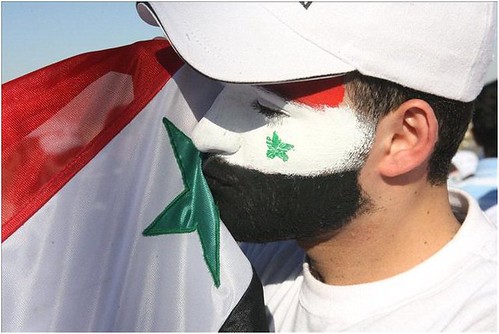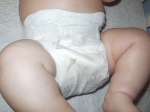
Syrian security forces on Sunday flooded a tense neighbourhood where a mourner was shot dead in the largest anti-regime rally seen in Damascus, activists said, blunting calls for a "day of defiance."
With protesters more emboldened in Damascus after 11 months of revolt which has largely escaped the city, President Bashar al-Assad's regime also came under regional pressure as Egypt joined other Arab League states in recalling its ambassador.
And the top US military officer warned on Sunday that intervention in Syria would be "very difficult" and said it would be "premature" to arm the opposition movement.
Although the security presence thwarted attempts to stage new protests in Mazzeh district, scene of a Saturday funeral that became a huge anti-regime rally, business there ground to a halt.
Mohammed Shami, a spokesman for activists in Damascus province, said most shops were shut in Mazzeh as well as in the Barzeh, Qaboon, Kfar Sousa and Jubar districts.
Student demonstrations had been expected in Mazzeh but security forces were stationed around schools, he said.
"Security forces are heavily deployed throughout Mazzeh," Shami said.
Another activist, Abu Huzaifa from the Mazzeh Committee, said police forced the family of Samer al-Khatib, 34, who died after being shot in the neck during the mass funeral on Saturday, to bury him in a small ceremony earlier than planned, in an apparent move to prevent protests.
Student protests however erupted after school in other areas of Damascus, including the districts of Al-Hajar Al-Aswad, Midan, Jubar and Barzeh, according to Shami.
In central Damascus shops opened as usual, witnesses said, while state television showed live interviews from Mazzeh with people who claimed life was normal there.
Deeb al-Dimashqi, a member of the Syrian Revolution Council based in the capital, told AFP earlier that "huge demonstrations" were expected, but added that security forces had imposed a tight clampdown.
In a message to Damascus residents on the "Syrian Revolution 2011" Facebook page, activists said: "The blood of the martyrs exhorts you to disobedience," after more than 6,000 deaths since anti-regime protests erupted in March, according to activist estimates.
Activists and official media reported at least 14 people killed on Sunday.
A "terrorist group" shot dead prosecutor Nidal Ghazal and judge Mohammed Ziyadeh and their driver in the northwestern province of Idlib, the official SANA news agency reported.
Four people, including a student, were killed and three wounded when gunmen fired on a bus in the central province of Hama, SANA said.
Security forces shot dead a woman when they stormed the town of Sukhna in Homs province as they hunted activists, the Britain-based Syrian Observatory for Human Rights said in a statement.
It also said that a man was shot dead at a checkpoint in the northern province of Aleppo.
A lawyer was shot dead as troops stormed the town of Al-Ashara in the province of Deir Ezzor, the Syrian Observatory said.
An army deserter was killed in Bab Sbaa in Homs, while three troopers were killed in a gunfight with deserters in Dael village in Daraa province, the southern cradle of dissent, the Observatory said.
Meanwhile, activists said regime forces pounded the flashpoint central city of Homs for the 15th straight day.
Sporadic shelling that targeted the Baba Amr neighbourhood in the defiant city intensified in the afternoon, at the rate of 4-5 rockets a minute, said Hadi Abdullah of the General Commission of the Syrian Revolution.
He also said the Bab Sbaa, Bab Dreib and al-Safsafa districts were being targeted with sporadic shelling.
Abdullah voiced fears that a new assault was imminent.
"News has been leaked to us from army officers about a bloody attack that will burn everything in Baba Amr. We were expecting the attack two nights ago, but it could have been just delayed because of the snowstorm," he said.
Demonstrations took place in several towns elsewhere, including Herak in Daraa, Tayyana in Deir Ezzor, and the city of Jisr al-Shughur in Idlib, and northeastern Qamishli, according to the Local Coordination Committees, which organise protests on the ground.
Saturday's funerals in Damascus were for four people, including two teenagers, killed on Friday when security forces fired on protesters in Mazzeh, which houses many government offices and embassies.
Meanwhile, General Martin Dempsey, chairman of the US Joint Chiefs of Staff, told CNN that Syria was the focus of competing Middle Eastern states, notably Iran and Saudi Arabia, and posed different problems for the United States than Libya did.
"It's premature to take a decision to arm the opposition movement in Syria because I would challenge anyone to identify for me the opposition movement in Syria at this point," Dempsey said in an interview.
"There's indications that Al-Qaeda is involved and that they're interested in supporting the opposition. I mean there's a number of players, all of whom are trying to reinforce their particular side of this issue.
"And until we're a lot clearer about, you know, who they are and what they are, I think it would be premature to talk about arming them."
But in the latest sign that international sanctions against Assad's regime are crippling the economy, leading Syrian businessman Faisal al-Qudsi told the BBC that foreign exchange reserves have tumbled from $22 billion (16.7 billion euros) to about $10 billion.
AFP, photo: Free Syria








































